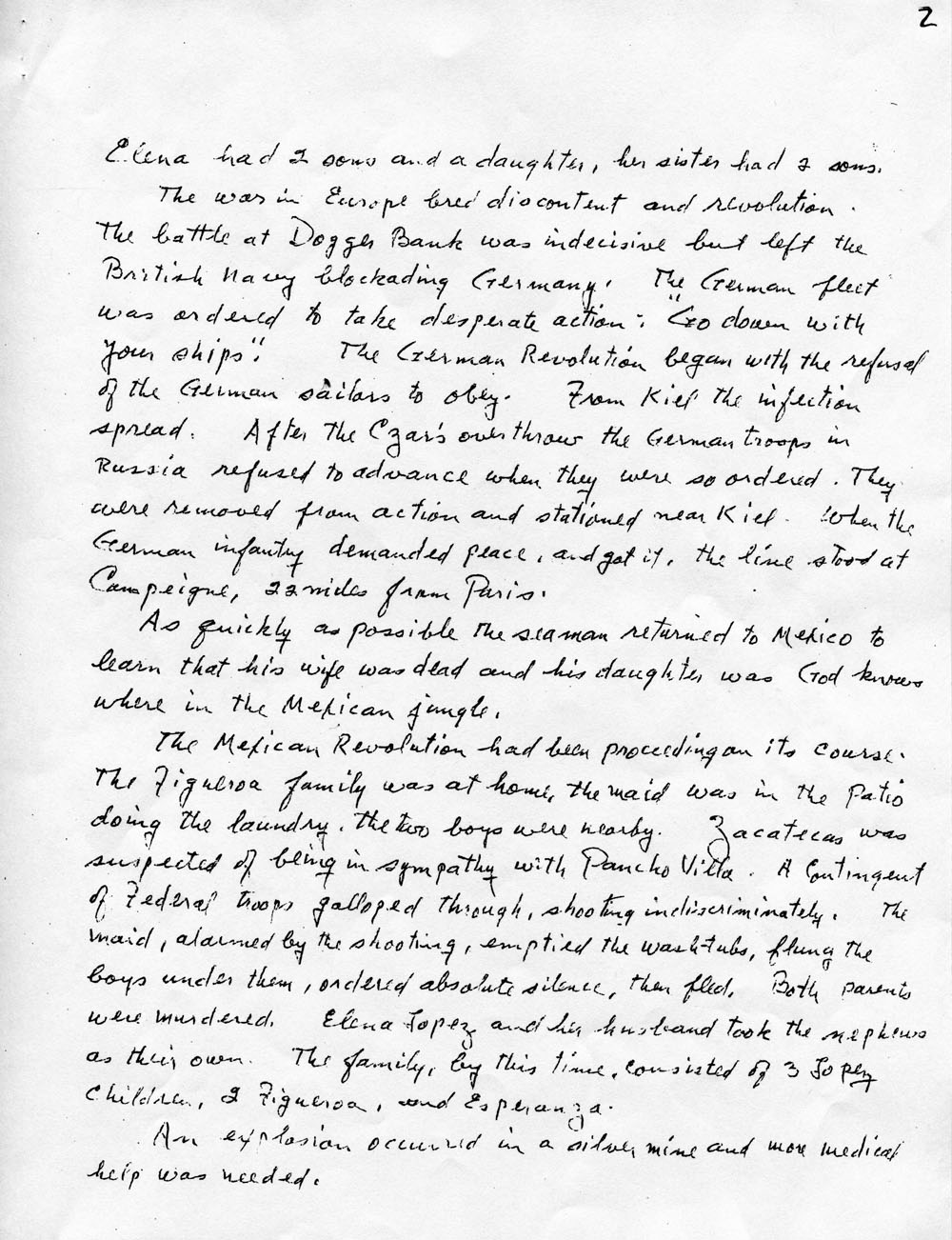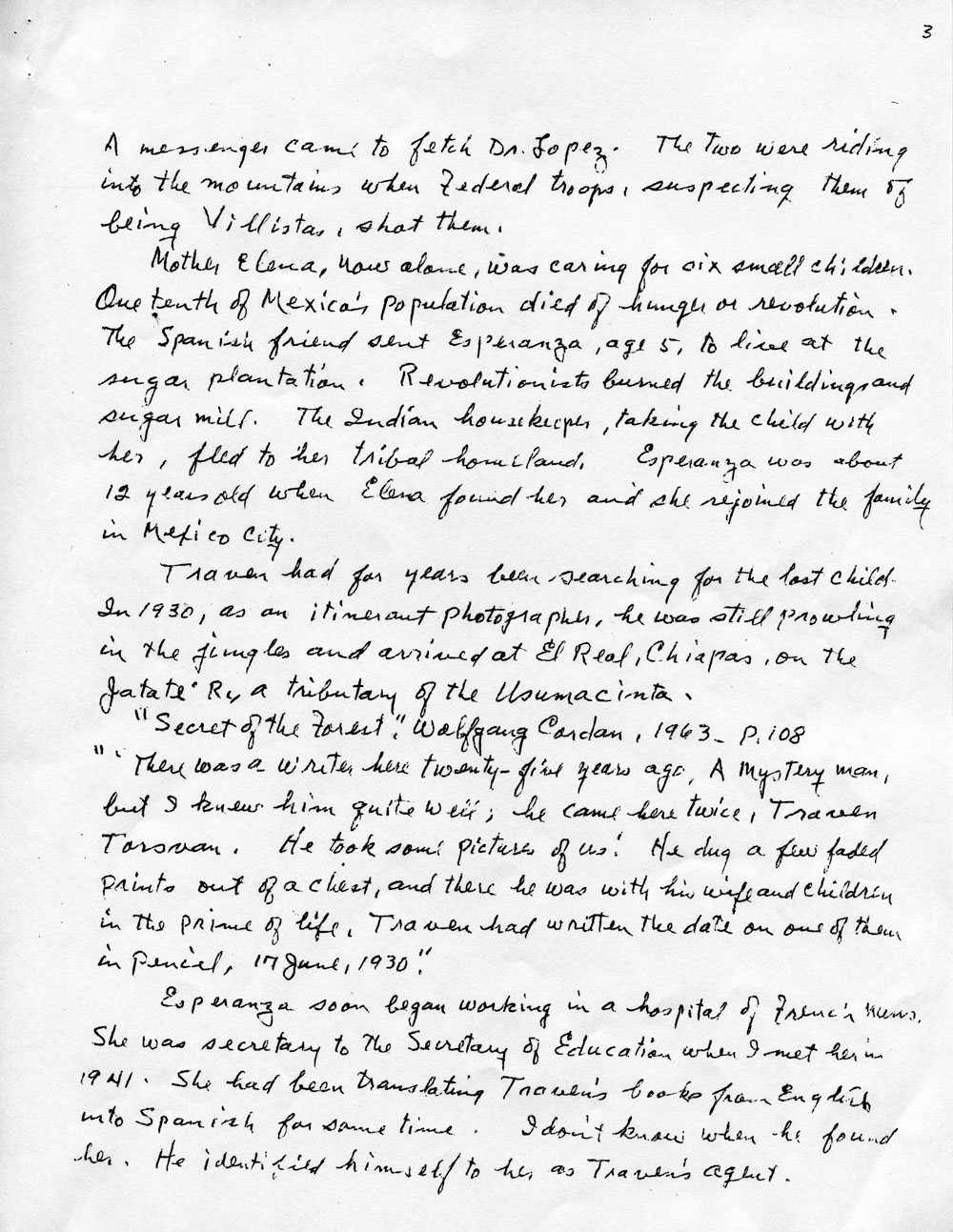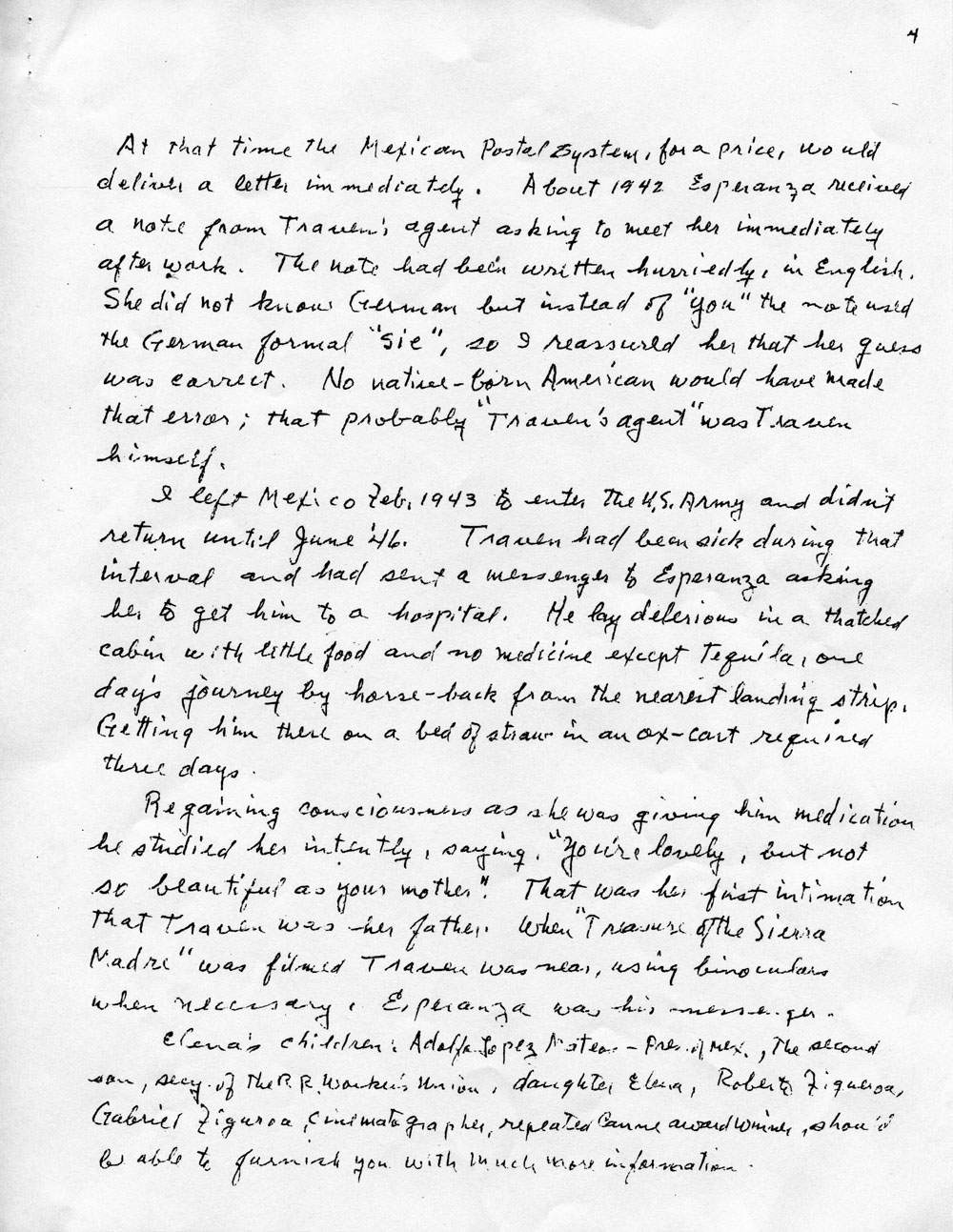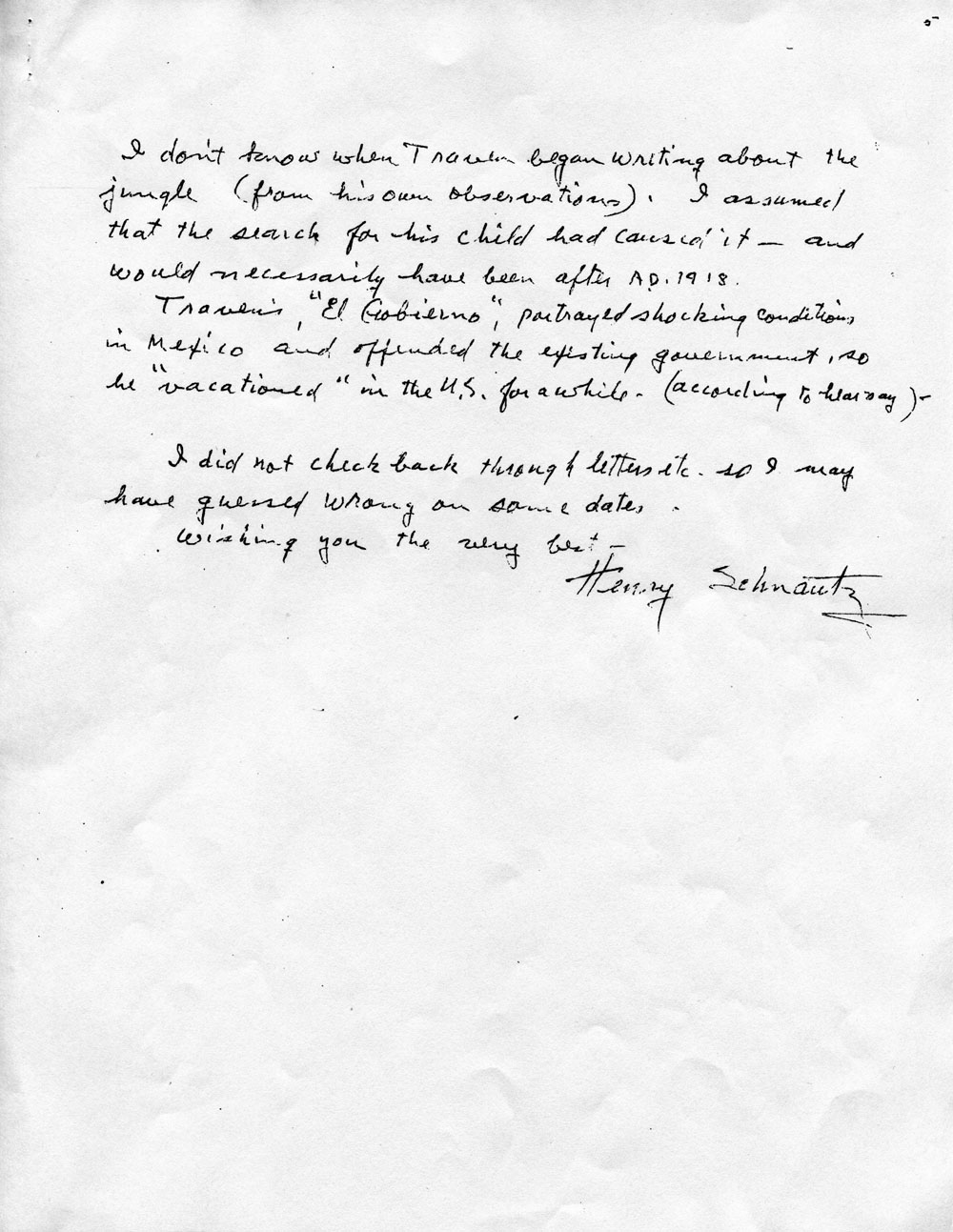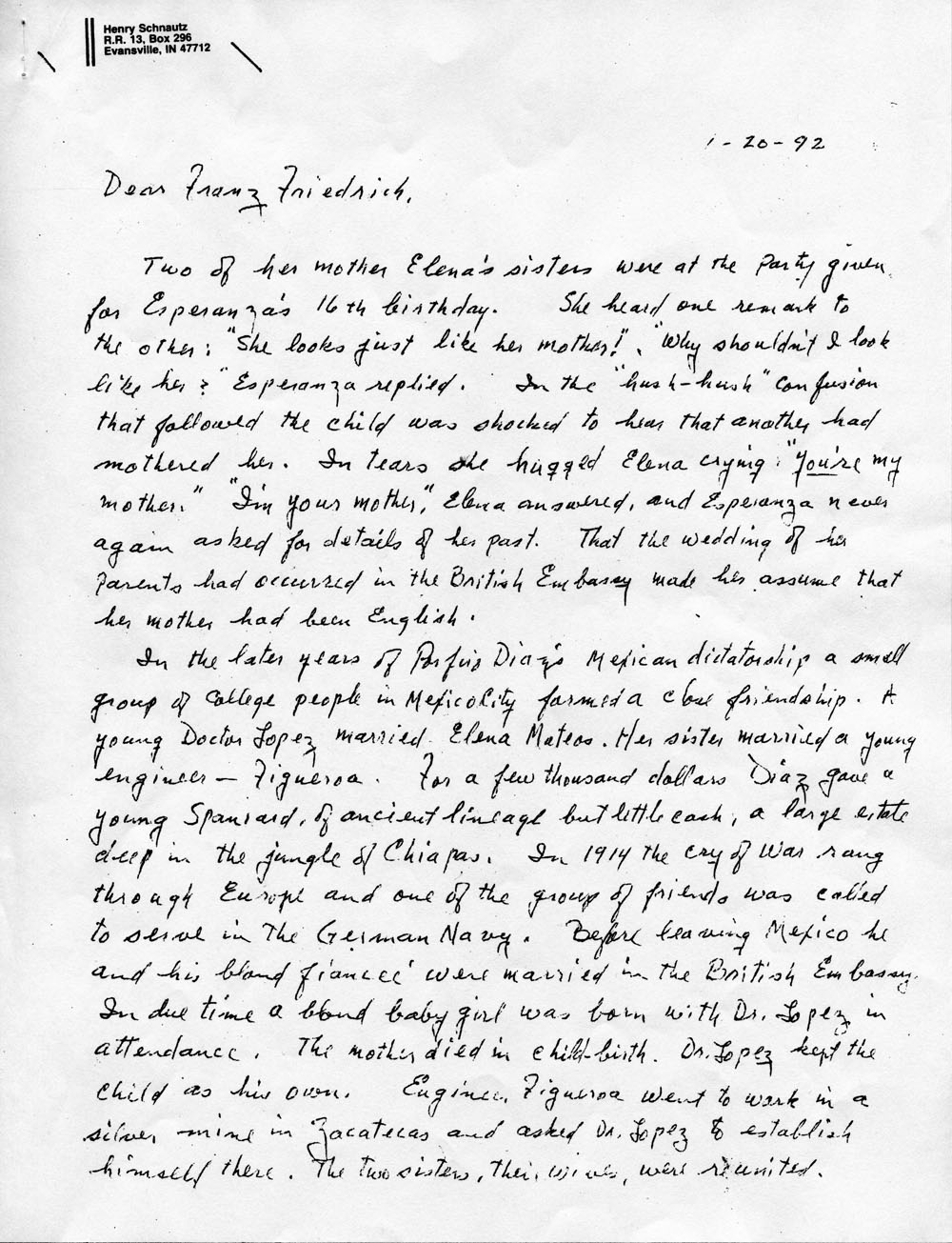
This fantastic story could only have come from Esperanza's lips. Once heard it was remembered. He wanted to believe. Traven must have had a hand in the writing of it. With so much detail, such as the German seaman returning to war, mixed with elements of truth, such as the Spaniard at the sugar mill in the far south, it takes its place in the Traven oeuvre.
1-20-92
Dear Franz Friedrich,
Two of her mother Elena's sisters were at the party given for Esperanza's 16th birthday. She heard one remark to the other: "she looks just like her mother!" "Why shouldn't I look like her?" Esperanza replied. In the "hush-hush" confusion that followed the child was shocked to hear that another had mothered her. In tears she hugged Elena crying, "You're my mother." "I'm your mother," Elena answered, and Esperanza never again asked for details of her past. That the wedding of her parents had occurred in the British Embassy made her assume that her mother had been English.
In the later years of Porfiro Diaz's Mexican dictatorship a small group of college people in Mexico City formed a close friendship. A young Doctor Lopez married Elena Mateos. Her sister married a young engineer - Figueroa. For a few thousand dollars Diaz gave a young Spaniard, of ancient lineage but little cash, a large estate deep in the jungle of Chiapas. In 1914 the cry of war rang through Europe and one of the group of friends was called to serve in the German Navy. Before leaving Mexico he and his blond fiancée were married in the British Embassy. In due time a blond baby girl was born with Dr. Lopez in attendance. The mother died in childbirth. Dr. Lopez kept the child as his own. Engineer Figueroa went to work in a silver mine in Zacatecas and asked Dr. Lopez to establish himself there. The two sisters, their wives, were reunited. Elena had 2 sons and a daughter. Her sister had 2 sons.
The war in Europe bred discontent and revolution. The battle at Dogger Bank was indecisive but left the British Navy blockading Germany. The German fleet was ordered to take desperate action: "Go down with your ships." The German Revolution began with the refusal of the German sailors to obey. From Kiel the infection spread. After the Czar's overthrow the German troops in Russia refused to advance when they were so ordered. They were removed from action and stationed near Kiel. When the German infantry demanded peace, and got it, the line stood at Campeigne, 22 miles from Paris.
As quickly as possible the seaman returned to Mexico to learn that his wife was dead and his daughter was God knows where in the Mexican jungle.
The Mexican Revolution had been proceeding on its course. The Figueroa family was at home. The maid was in the patio doing the laundry. The two boys were nearby. Zacatecas was suspected of being in sympathy with Pancho Villa. A contingent of Federal troops galloped through, shooting indiscriminately. The maid, alarmed by the shooting, emptied the washtubs, flung the boys under them, ordered absolute silence, then fled. Both parents were murdered. Elena Lopez and her husband took the nephews as their own. The family, by this time, consisted of 3 Lopez children, 2 Figueroa, and Esperanza.
An explosion occurred in a silver mine and more medical help was needed. A message came to fetch Dr. Lopez. The two were riding into the mountains when Federal troops, suspecting them of being Villistas, shot them.
Mother Elena, now alone, was caring for six small children. One tenth of Mexico's population died of hunger or revolution. The Spanish friend sent Esperanza, age 5, to live at the sugar plantation. Revolutionists burned the building and sugar mill. The Indian housekeeper, taking the child with her, fled to her tribal homeland. Esperanza was about 12 years old when Elena found her and she rejoined the family in Mexico City.
Traven had for years been searching for the lost child. In 1930, as an itinerant photographer, he was still prowling in the jungle and arrived at El Real, Chiapas, on the Jatate River, a tributary of the Usumacinta.
"Secret of the Forest", Wolfgang Cordan, 1963, p.108. "'There was a writer here twenty-five years ago, a mystery man, but I knew him quite well. He came here twice, Traven Torsvan. He took some pictures of us.' He dug a few faded prints out of a chest, and there he was with his wife and children in the prime of life. Traven had written the date on one of them in pencil, 17 June, 1930."
Esperanza soon began working in a hospital of French nuns. She was secretary to the Secretary of Education when I met her in 1941. She had been translating Traven's books from English into Spanish for some time. I don't know when he found her. He identified himself to her as Traven's agent. At that time the Mexican Postal System, for a price, would deliver a letter immediately. About 1942 Esperanza received a note from Traven's agent asking to meet her immediately after work. The note had been written hurriedly, in English. She did not know German but instead of "you" the note used the German formal "sie", so I reassured her that her guess was correct. No native-born American would have made that error; that probably "Traven's agent" was Traven himself.
I left Mexico Feb. 1943 to enter the U.S. Army and didn't return until June '46. Traven had been sick during that interval and had sent a messenger to Esperanza asking her to get him to a hospital. He lay delirious in a thatched cabin with little food and no medicine except Tequila, one day's journey by horse-back from the nearest landing strip. Getting him there on a bed of straw in an ox-cart required three days.
Regaining consciousness as she was giving him medication he studied her intently, saying, "You're lovely, but not so beautiful as your mother." That was her first intimation that Traven was her father. When "Treasure of the Sierra Madre" was filmed Traven was near, using binoculars when necessary. Esperanza was his messenger.
Elena's children: Adolfo Lopez Mateos - President of Mexico, The second son, secretary of the Railroad workers union, daughter Elena, Roberto Figueroa, Gabriel Figueroa, cinematographer, repeated Cannes award winner, should be able to furnish you with much more information.
I don't know when Traven began writing about the jungle (from his own observations). I assumed that the search for his child had caused it - and would necessarily have been after A.D. 1918.
Traven's, "El Gobierno," portrayed shocking conditions in Mexico and offended the existing government, so he "vacationed" in the U.S. for awhile (according to hearsay).
I did not check back through letters etc., so I may have guessed wrong on some dates.
Wishing you the very best -
Henry Schnautz

